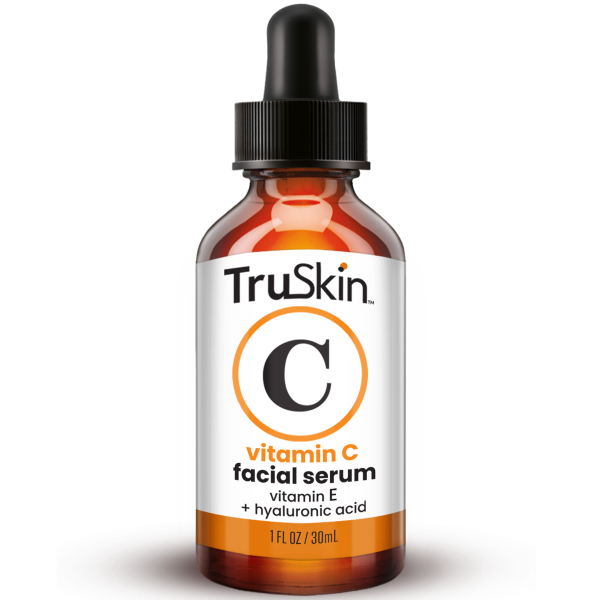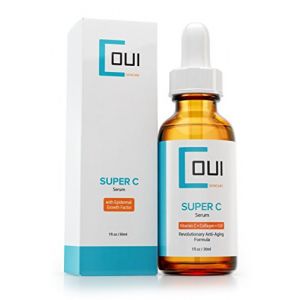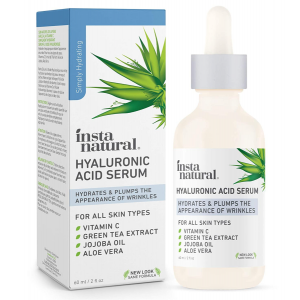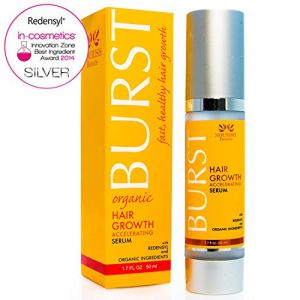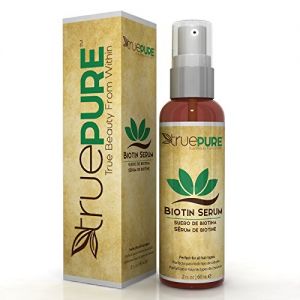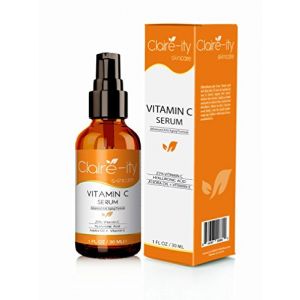TruSkin Vitamin C Serum
Phenoxyethanol (safe in small amounts)
- Fragrance-free
- Cruelty-free
- Paraben-free
- Vegan
- Pros:
- Antioxidant facial serum with highly concentrated vitamin C along with additional nutrients (e.g., vitamin C, E)
- Contains hyaluronic acid and jojoba oil which hydrate the skin
- May enhances collagen production and supplies facial skin with vital nutrients
- Targets the signs of aging
- May reduces the appearance of sun spots, dark spots, wrinkles, and fine lines
- Promotes brighter, firmer skin
- Formulated and bottled in the USA
- Free of artificial fillers, harsh chemicals, synthetic color additives, fragrance, and stabilizers
- Cruelty-free
- is packaged in a dark bottle which helps protect ingredients from degrading from the effects of light
Ingredients Concern: Phenoxyethanol (considered safe in small amounts)
Cons:
Vitamin C topicals have questionable effectiveness because of stability. This means that ince light or air hits the serum, there is no assurance that the product continues to work.
Contains a derivative of Vitamin C (Sodium Ascorbyl Phosphate) which has not been shown in scientific studies to produce anti-aging benefits.
It is unclear whether the Sodium Ascorbyl Phosphate (Vitamin C) in this serum will convert into ascorbic acid in the body and produce the same results that Vitamin C is known for.
Patch test recommendation, This is a concentrated and powerful facial serum containing active plant-based ingredients that may cause skin-irritation or breakouts for those with allergies
The color of the serum may vary from nearly clear to cloudy or milky white due to the lack of artificial stabilizers, fillers, and coloring. It is perfectly normal for the serum to range from almost clear, to quite cloudy.
This serum contains Sodium Ascorbyl Phosphate (Vitamin C) which is a derivative of Vitamin C. There is not sufficient scientifical evidence to prove that this form of Vitamin C produces anti-aging results.
For example, one study stated that "It should also be mentioned that there is an increasing number of ascorbic acid-based topical cosmetics available on the market, and it seems that not all preparations of topical ascorbic acid are effective. Many of these products use derivatives, esters, and analogs of ascorbic acid that do not penetrate the skin, do not chemically convert to L-ascorbic acid (the only form that can be used by the body), and/or are not delivered in adequate concentration. These ascorbic acid substitutes include ascorbyl palmitate, magnesium ascorbyl phosphate, ascorbic acid sulfate, ascorbyl stearate, ascorbyl dipalmitate, and ascorbic acid magnesium phosphate, which are easily stabilized but must be converted to L-ascorbate to be effectively useful. There is no direct evidence that ascorbic acid derivatives enter the skin in appreciable amounts, and it seems that their conversion to L-ascorbate is largely inefficient, thus precluding effective concentration delivery. [6]
Another study also states that "Formulations containing derivatives of ascorbic acid have been found to be more stable, but they DO NOT produce the same effect as that of the parent compound." [7]
Because Vitamin C is not stable, as it degrades when it comes into contact with light or air, there is a huge questiion as to whether it will really work. Note that products sit in hot warehouses, go through extensive shipping and have the potential to degrade due to heat. Derivatives have been theorized to have more stability than ascorbic acid, yet this is not certain and some tests show that many derivatives are not stable. However, note that the jojoba and the hyaluronic acid in this serum may provide a nice benefit to the skin in terms of mositurization and hydration. (D-alpha Tocopheryl Acetate) helps improve firmness and skin tone, thereby targeting the signs of premature aging [1]. Hyaluronic acid has moisturizing properties that are beneficial for the skin [2]. JoJoba oil is commonly used for skin products as it slows down the skin aging process and reduces the incidence of skin infections [3]. Aloe barbadensis boosts the body's natural wound-healing processes [4].
If this form of Vitamin C derivative in this serum does effectively convert into ascorbic acid and work, and it remains stable -- then we may consider looking at the results that have been shown for ascorbic acid. Topical ascorbic acid has been shown to stimulate collagen growth and protect skin from erythema, the redness caused by UV rays from the sun. [6] It has also been shown to help reduce fine wrinkles, improve skin firmness and tone, improve yellowness and sallowness. [8]. Hyaluronic acid has moisturizing properties that are beneficial for the skin [2]. (Vitamin C) has antioxidant properties that target irritated, inflamed skin and this vitamin also acts directly upon collagen metabolism by stimulating the production of collagen and elastin fibers in the skin, thereby promoting healthy, vibrant skin [1]. Vitamin E
All Ingredients: Organic Deionized Herbal Infusion, Organic Aloe Barbadensis Leaf (Aloe), Sodium Ascorbyl Phosphate (Vitamin C), MSM, Botanical Hyaluronic Acid (Cassia Angustifolia Seed Polysaccharide), Hamamelis Virginiana (Witch Hazel), Vitamin E (d-alpha Tocopheryl Acetate), Carbomer, (2s)-2-Amino-5-guanidinopentanoic Acid, Organic Gotu Kola, Wildcrafted Horsetail (Equisetum Arvense), Wildcrafted Dandelion, Wildcrafted Geranium, Organic Jojoba Oil (Organic Simmondsia Chinensis), Phenoxyethanol, Ethyl Hexyl Glycerin

